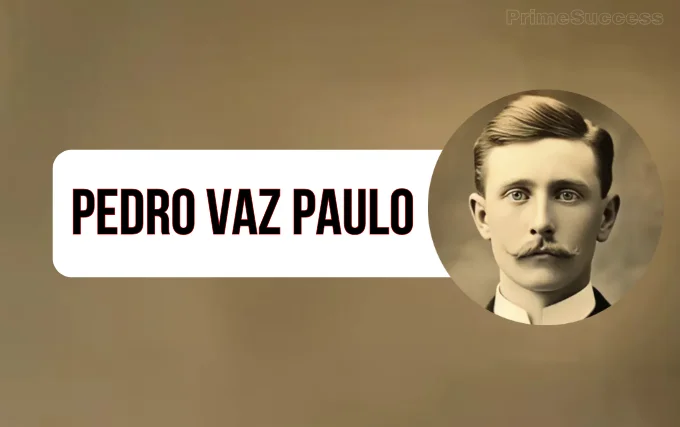Exploring the Legacy of Pedro Vaz Paulo: A Revolutionary Mind in Modern Thought

Introduction to Pedro Vaz Paulo
Pedro Vaz Paulo is a figure whose influence continues to shape modern thought across various disciplines. Born into a milieu that fostered intellectual curiosity, Vaz Paulo exhibited an affinity for critical thinking from an early age. This proclivity subsequently guided him through his educational pursuits, where he excelled in logical reasoning and philosophical inquiry. His formative years were marked by an exploration of diverse ideologies, which contributed significantly to his innovative approach to problem-solving and theorizing.
During his academic journey, Pedro Vaz Paulo attended prestigious institutions where he delved deeply into philosophy, sociology, and the sciences. His educational background provided him with a solid foundation in analytical skills, encouraging a multidisciplinary perspective that many modern thinkers now aspire to emulate. This comprehensive educational experience enabled him to draw connections between seemingly disparate ideas, allowing him to forge pathways in thought that were previously unrecognized.
At the core of Pedro Vaz Paulo’s philosophy is the concept of holistic understanding. He posits that interconnectedness among various domains of knowledge is essential for genuine comprehension and innovation. This principle is reflected in his writings, which advocate for a synthesis of ideas and methodologies. By doing so, Vaz Paulo inspires individuals to challenge conventional wisdom, urging them to consider broader contexts when addressing contemporary issues. His legacy is, therefore, not just rooted in his own findings but also in the encouragement of future generations to engage with complex problems through an integrated lens.
This introductory overview sets the stage for a deeper exploration of Pedro Vaz Paulo’s contributions and significance in contemporary discourse. As we delve into his revolutionary ideas and the implications they have on modern thought, it becomes increasingly clear that his work may continue to resonate with scholars and practitioners alike.
The Intellectual Contributions of Pedro Vaz Paulo
The intellectual contributions of Pedro Vaz Paulo are profound and wide-ranging, impacting several disciplines including philosophy, sociology, and psychology. His works constantly explore the interface between individual thought and collective understanding, emphasizing the intricate relationship between the two. Pedro Vaz Paulo’s theories challenge conventional wisdom and promote a nuanced perspective on human behavior and societal norms.
One of his seminal works focuses on the role of subjective experiences in shaping societal structures. By integrating qualitative methodologies with theoretical frameworks, Pedro Vaz Paulo positions personal narratives as critical to understanding broader social phenomena. This innovative approach has inspired subsequent research in sociology, urging scholars to reconsider the impact of individual lived experiences on collective societal norms.
In the field of psychology, Vaz Paulo’s contributions are equally transformative. His research into cognitive processes emphasizes the importance of context and environment in shaping thought patterns. By examining the psychology behind decision-making and belief formation, he has provided valuable insights into how cognitive biases affect our understanding of reality. These findings have significant implications for fields such as behavioral economics and clinical psychology, influencing both academic research and practical applications.
Moreover, Pedro Vaz Paulo has made strides in philosophical discourse by engaging with existential themes and human agency. His writings challenge the deterministic view of human behavior, advocating for a more holistic approach that considers free will and moral responsibility. This philosophical stance not only enriches academic dialogue but also resonates with practitioners in various fields who seek to understand the complexities of human action.
Ultimately, the theories and ideas put forth by Pedro Vaz Paulo have established a foundational influence across numerous academic disciplines. His interdisciplinary approach continues to inspire new avenues of research and thought, solidifying his status as a revolutionary mind in modern intellectual discourse.
Pedro Vaz Paulo’s Influence on Modern Thought
Pedro Vaz Paulo has emerged as a significant figure in contemporary intellectual discourse, with his ideas resonating deeply across various academic and cultural landscapes. His ability to challenge established norms and provoke critical thought has inspired a new wave of thinkers. The relevance of his contributions can be traced through numerous modern movements, particularly in the fields of philosophy, social theory, and political science.
One notable aspect of Vaz Paulo’s influence is his interdisciplinary approach. By blending insights from diverse fields, he has encouraged scholars to adopt more holistic perspectives. This has led to the formation of new paradigms that interrogate traditional boundaries of knowledge. His work promotes the idea that understanding complex social issues requires drawing on multiple disciplines, thus fostering a more inclusive intellectual environment.
Moreover, Vaz Paulo’s emphasis on dialogue and collaboration among scholars has significantly shaped the modern academic landscape. His advocacy for open discourse has inspired many thinkers to engage in cooperative frameworks, breaking down the barriers between differing schools of thought. This approach not only enriches academic discussions but also ensures that marginalized voices are included in the conversation, allowing for a broader understanding of contemporary issues.
In recent years, several emerging movements have cited Pedro Vaz Paulo as a pivotal influence. Scholars dedicated to social justice, environmental sustainability, and technological ethics frequently reference his ideas to bolster their arguments. His insights challenge conventional wisdom, encouraging a critical re-evaluation of existing narratives and motivating action toward progressive change.
Overall, the enduring impact of Pedro Vaz Paulo on modern thought is evident in the continuous evolution of intellectual trends that prioritize inclusivity, interdisciplinary collaboration, and critical engagement with societal issues. The legacy of his ideas remains a source of inspiration for future generations of thinkers who seek to innovate and redefine academic discourse for a better tomorrow.
Critical Perspectives on Pedro Vaz Paulo’s Work
Pedro Vaz Paulo is often celebrated for his revolutionary contributions to modern thought, yet, like many influential figures, his work is not without its critiques. Scholars and critics have raised various concerns regarding his methodologies and conclusions, prompting important discussions within academic circles. One significant area of criticism revolves around what some perceive as a lack of empirical support for his theories. Detractors argue that certain concepts proposed by Pedro Vaz Paulo lean heavily on philosophical speculation rather than being grounded in rigorous scientific inquiry.
Furthermore, critics have pointed out potential biases in his interpretations of data or historical contexts, which they argue could skew his conclusions. For instance, while Pedro Vaz Paulo has made substantial contributions to our understanding of human behavior, some scholars question whether his approaches adequately account for cultural differences and nuances. They assert that his frameworks may not be universally applicable, suggesting that his theories are more reflective of specific socio-economic contexts rather than offering a comprehensive understanding applicable across diverse settings.
Additionally, debates have emerged about his treatment of opposing viewpoints. Some critique Pedro Vaz Paulo for not sufficiently engaging with counterarguments, which could strengthen his assertions if thoughtfully addressed. This has led to calls for a more inclusive discourse within his work, advocating for an interdisciplinary approach that acknowledges differing perspectives in order to enrich and expand upon his foundational theories. Ultimately, while Pedro Vaz Paulo undoubtedly made significant strides in modern thought, exploring these critiques provides a more nuanced understanding of his legacy and the ongoing dialogue surrounding his contributions.
Case Studies: Applications of Pedro Vaz Paulo’s Ideas
The philosophies posited by Pedro Vaz Paulo have found their way into various fields, demonstrating the versatility and relevance of his thoughts in real-world applications. One notable case study is in the realm of education, where institutions have integrated his ideas to foster critical thinking and dialogue among students. By implementing dialogical methods, educators have reported enhanced student engagement and a more profound understanding of complex topics. These approaches encourage learners to not only absorb information but to debate and challenge it, reminiscent of Vaz Paulo’s emphasis on discourse as a vehicle for knowledge acquisition.
Another significant area influenced by Pedro Vaz Paulo’s revolutionary ideas is organizational development. Businesses have begun to apply his principles of collective intelligence and participatory governance to improve workplace environments. Through collaborative decision-making processes, companies have observed increased employee satisfaction and productivity. Implementing these ideas has allowed organizations to dismantle hierarchical barriers, making them more agile and responsive to change. The tangible outcomes in morale and performance affirm the effectiveness of adopting Vaz Paulo’s philosophies in practical scenarios.
Furthermore, in community development initiatives, several projects have harnessed his concepts of social equity and justice. By involving community members in the planning and execution stages, project leaders have not only cultivated a sense of ownership but have also tailored solutions that are profoundly aligned with the needs of their constituents. The results from such initiatives have often led to sustained improvements in community welfare and a stronger sense of cohesion among residents.
In conclusion, the practical applications of Pedro Vaz Paulo’s philosophies in education, organizational development, and community building illustrate the expansive influence of his ideas. These case studies not only validate his theories but also underscore the vital importance of integrating innovative thought into everyday practice for fostering progress and improvement across various sectors.
Pedro Vaz Paulo in Popular Culture
The influence of Pedro Vaz Paulo extends beyond academic and philosophical circles into the realms of literature, film, and various forms of media, reflecting his revolutionary ideas. His thoughts on existentialism and social justice have inspired a wide array of creative works that engage with complex human experiences. Authors have drawn upon his theories to develop rich narratives that delve into the human condition, often intertwining his concepts within their characters’ journeys.
In literature, numerous novels and essays reference the tenets of Pedro Vaz Paulo, illustrating themes of individualism and societal critique. For instance, contemporary authors have adopted elements of his philosophy, weaving them into their narratives, thus bringing his revolutionary ideas to a broader audience. These literary works not only highlight his influence but also challenge readers to confront their own beliefs. Similarly, poetry often encapsulates the emotional resonance of his thoughts, with poets interpreting themes of freedom and identity central to his philosophy.
Film and television have not stayed untouched by the legacy of Pedro Vaz Paulo; his influence can be seen in various cinematic works that explore existential themes. Many filmmakers incorporate his thoughts and philosophies into their scripts, presenting characters who grapple with profound moral dilemmas and personal awakening. These portrayals make his complex ideas accessible to the general public and often encourage discussions about their relevance in contemporary society.
Moreover, media representation has solidified Pedro Vaz Paulo’s status as a cultural figure whose ideas continue to resonate. Documentaries and talk shows delve into his philosophies, analyzing their application to modern issues. Through these platforms, audiences gain insights into his revolutionary thought and its necessity in navigating the challenges of today’s world.
The Future of Pedro Vaz Paulo’s Legacy
As we delve into the potential future relevance of Pedro Vaz Paulo’s work, it becomes evident that his revolutionary mindset offers a framework for navigating emerging societal issues. The landscape of contemporary thought is continually evolving, shaped by technological advancements, global challenges, and shifting cultural perspectives. In this context, the ideas propounded by Pedro Vaz Paulo could significantly influence future discourse.
One of the most pressing issues today is the intersection of technology and ethics. In an era where artificial intelligence and automation are reshaping industries, the principles laid out by Pedro Vaz Paulo regarding the human experience and social responsibility gain renewed importance. His emphasis on human-centric approaches may inform future policymakers and technologists as they strive to integrate ethical considerations into their innovations, ensuring that the benefits of technology are equitably distributed.
Additionally, as societies grapple with climate change and sustainability, the innovative thoughts of Pedro Vaz Paulo can serve as a guiding philosophy. His focus on collaborative efforts and collective accountability encourages a response to environmental challenges that is both inclusive and practical. This mindset could inspire new movements and ecological strategies that prioritize the well-being of future generations while addressing current environmental degradation.
Moreover, as globalization continues to connect diverse cultures, the insights of Pedro Vaz Paulo on communication and intercultural understanding can foster dialogue and mutual respect. His legacy may empower future leaders to engage in diplomacy and conflict resolution that emphasizes empathy and shared human values, ultimately contributing to a more harmonious global society.
Ultimately, the future of Pedro Vaz Paulo’s legacy will likely hinge on its adaptability to these pressing societal needs. As thinkers and creators draw from his principles, they can innovate solutions that resonate with contemporary audiences while staying true to the essence of his revolutionary ideas.
Insights from Scholars
In exploring the legacy of Pedro Vaz Paulo, numerous scholars and intellectuals have shared their perspectives, reflecting on his profound impact on contemporary thought. Dr. Maria Almeida, a noted philosopher, emphasizes that Vaz Paulo challenged conventional paradigms, encouraging a more holistic understanding of societal dynamics. She states, “His work serves as a bridge between traditional philosophical discourse and modern socio-political realities, a true testament to his revolutionary intellect.” This sentiment resonates across various academic disciplines, illustrating how Pedro Vaz Paulo’s ideas continue to inspire critical examination of established norms.
Furthermore, Professor Leandro Santos, whose research focuses on modern philosophy, acknowledges the innovative methodologies introduced by Vaz Paulo. “What I find compelling about his approach is the fusion of empirical analysis with theoretical frameworks which promotes a multifaceted exploration of issues,” he elaborates. Santos’s insights reveal that Vaz Paulo’s methodologies not only address complex social problems but also trigger new avenues of inquiry among scholars.
Additionally, Dr. Helena Cardoso, an expert in ethics, highlights the moral dimensions of Pedro Vaz Paulo’s work. According to her, “His emphasis on ethical responsibility resonates strongly in today’s global context, urging both individuals and institutions to act conscientiously.” This ethical framework posits Vaz Paulo as a visionary thinker whose contributions extend beyond philosophy and into the realms of public policy and social justice.
These varying perspectives underscore the significance of Pedro Vaz Paulo in contemporary intellectual discussions. By encouraging debate and reflection, he has paved the way for future generations of thinkers. As scholars examine his profound influence, it becomes clear that his ideas will continue to resonate, fostering innovation and challenging intellectual boundaries in our ever-evolving world.
Conclusion
Pedro Vaz Paulo remains a pivotal figure whose contributions have significantly shaped contemporary thought and discourse across various fields. His revolutionary ideas and methodologies have not only influenced academic spheres but also permeated societal discussions, addressing pressing issues that resonate with diverse audiences. Vaz Paulo’s capacity to provoke critical thinking and inspire dialogue is evident in the numerous theoretical frameworks and practical applications derived from his work.
The legacy of Pedro Vaz Paulo can be observed in various areas, including philosophy, sociology, and political theory. His innovative perspectives challenge traditional paradigms and encourage scholars and practitioners alike to reevaluate existing frameworks. This reexamination fosters a deeper understanding of complex societal dynamics, subsequently paving the way for innovative solutions to modern problems. By intertwining theory with practicality, Vaz Paulo’s methodologies provide indispensable tools for addressing contemporary challenges.
Moreover, the impact of Pedro Vaz Paulo extends beyond academia, influencing public policy and social movements. His assertions about justice, equality, and human rights continue to serve as a foundation for discussions aimed at fostering societal progress. Whether through educational reforms, advocacy initiatives, or literature that inspires collective action, the essence of his teachings is palpable in many contemporary efforts aimed at creating a more equitable society.
In conclusion, the enduring impact of Pedro Vaz Paulo is characterized by his ability to resonate within both intellectual circles and broader societal contexts. His revolutionary insights continue to inform debates and inspire future generations of thinkers, ensuring that the relevance of his work remains prominent in ongoing discussions about modern thought. As society continues to grapple with complex dilemmas, the principles advocated by Vaz Paulo will undoubtedly shape future dialogues and innovations.
You May Also Read This Usaworldtoday.



